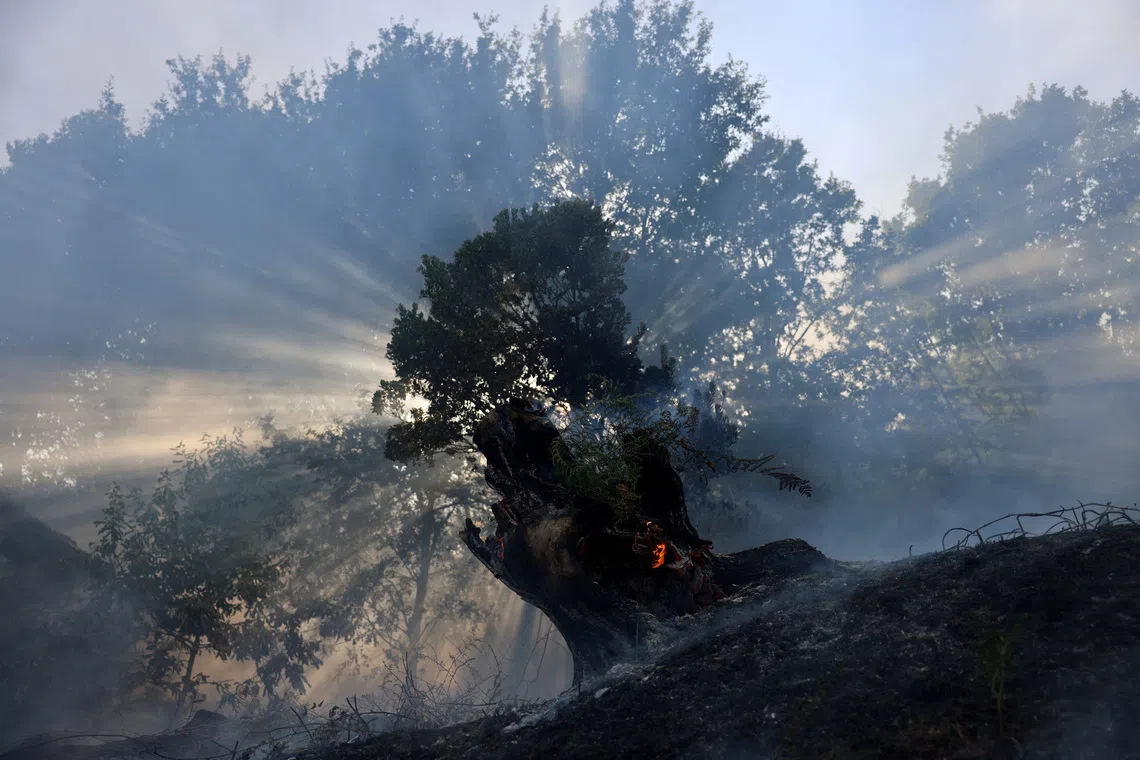Takeaways from the COP30 climate summit in Brazil
Sign up now: Get ST's newsletters delivered to your inbox

FILE PHOTO: Fire burns inside the trunk of a tree in Vilar de Condes, Galicia, Spain, August 15, 2025. REUTERS/Nacho Doce/File Photo
BELEM, Brazil - This year's U.N. climate change summit ended with a tenuous compromise for a deal that skipped over most countries' key demands but for one: committing wealthy countries to triple their spending to help others adapt to global warming.
Here are some of the takeaways from the COP30 climate summit held in Brazil's Amazon city of Belem:
HOOKED ON HYDROCARBONS
Brazil's President Luiz Inácio Lula da Silva had launched the summit calling for countries to agree on a "roadmap" for advancing a COP28 pledge to shift away from fossil fuels.
But it was a road to nowhere at this summit, as oil-rich Arab nations and others dependent on fossil fuels blocked any mention of the issue. Instead, the COP30 presidency created a voluntary plan that countries could sign on to - or not.
The result was similar to Egypt's COP27 and Azerbaijan's COP29, where countries agreed to spend more money to address climate dangers while ignoring their primary cause.
Nearly three-fourths of the world's greenhouse gas emissions since 2020 have come from coal, oil and gas. Demand for these fuels is likely to rise through 2050, the International Energy Agency said in a report midway through the COP30 summit that reversed expectations of a rapid shift to clean energy.
GLOBAL CLIMATE UNITY ON THE BRINK
The need to show global unity in climate talks was the main thing countries agreed, along with the idea that long-polluting wealthy countries should do most to tackle the problem.
But to get to a final deal, they ditched nearly all ambitions they'd brought - including mandatory tightening targets for reducing climate-warming emissions.
Brazil's COP30 presidency lamented the United States' snubbing of the talks. The absence of the world's biggest economy - and biggest historical polluter - emboldened countries with fossil fuel interests.
Rumbling concerns about a process that allows only a few to effectively veto collective deals grew louder, stoking calls for reform.
After Brazil had promised a 'COP of Truth' that would set countries on course for action, the omission of any agreed implementation plans was glaring.
CHINA IN POLE POSITION
China played a leading role at the summit - but from behind the scenes.
President Xi Jinping skipped the talks as he typically does. But his delegation carried a strong message that China was prepared to deliver the clean energy technology the world needs to cut emissions.
Executives from Chinese solar, battery and electric vehicle companies were featured at the country's exhibit pavilion - one of the first things delegates saw on entering the sprawling venue.
China was not the only fast-developing nation in focus this year. The Indian delegation flexed more muscle in the negotiations, while South Africa rolled out a climate-linked agenda for its own November 22-23 G20 summit.
FRAUGHT FUTURE FOR FORESTS AND INDIGENOUS RIGHTS
Holding the summit in an Amazon forest city, Brazil touted the importance of the world's remaining canopy for fighting climate change - along with the roughly half-billion Indigenous people seen as stewards of natural lands.
Many who attended from across the Amazon and the world felt frustrated they weren't being heard. They staged several protests, and even stormed the COP30 compound gates - clashing with security before being pushed back out.
Countries announced about $9.5 billion in forest funding - including almost $7 billion for Brazil's flagship tropical forest fund and another $2.5 billion for an initiative for Congo.
But the summit ended on a sour note for many, as negotiators dropped efforts for a roadmap to meet the 2030 zero-deforestation pledge and gave no recognition for the protection of their lands.
ATTACKS ON CLIMATE SCIENCE
While Lula and other world leaders had railed against misinformation and denial, COP30 talks didn't help much in countering this year's U.S. government assault on climate science.
The summit also chipped away at global consensus around climate science by no longer recognizing the U.N. Intergovernmental Panel on Climate Change as the "best available science" to guide policy on climate change and its impacts.
Instead, the final deal notes the importance of IPCC outputs along with "those produced in developing countries and relevant reports from regional groups and institutions."
And by sidelining fossil fuels and emissions targets, COP30 ignored the alarm bells being rung by scientists. REUTERS


